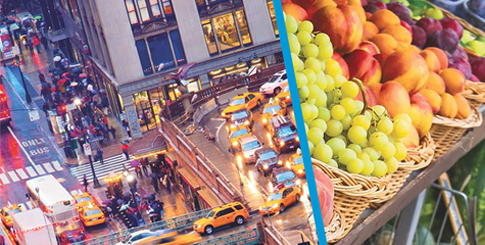“The overall state of the economy is not as strong as it’s perceived by many. It’s a buyer’s market, with no real inflation to account for an increase in prices over the previous year, and other factors such as no increase in real wages and flat demand in product from consumers—much of this has to do with the fact that it’s an election year,” Pelosi remarks.
“It’s almost always the case during a presidential election that the economy slows down,” Pelosi continues. “Investing slows up as everyone’s waiting to see the results of the election, and which way things turn as a consequence.”
Business costs have been relatively stable. “Fuel costs are under control, labor has been a consistent cost as our workers are all under a contract that won’t expire for a few years, and the weather has mostly cooperated this whole year,” Pelosi says. But, “there’s a sense that everything has slowed down—we’re waiting to see what will happen.”
Choices & Challenges
Keeping Perishables Moving
A potential move and the presidential election aren’t the only significant challenges facing Hunts Point and its merchants.
The terminal market has myriad issues to address, many of which are familiar to people in the produce industry all over America, and some unique to the New York area.
“Food safety is a critical issue, and is of increasing importance to us,” says Fres Co’s DiMaggio. This, of course, makes the lack of physical space in the facility of even greater prominence, as the tight berths bite into critical turnaround time and increase the risk of spoilage.
Katzman likewise cites logistics and the associated issues of spoilage and food safety, which she says is the company’s biggest trial other than the region’s sometimes wild weather. “Getting the product where it needs to be, when it needs to be there, is a challenge on both inbound and outbound deliveries,” she explains. “It’s not a crazy concept, but the execution can be difficult. And weather controls the supply; this business is a perfect example for page one in an economics textbook: we are the true definition of the supply and demand model.”
Yes, weather does indeed play a role, both within New York state and all along the Eastern Seaboard. Kazan refers to the impact of El Niño on California, Mexico, Texas, and Florida as a major challenge and drag on business growth early in the year. Weather patterns negatively impacted both the availability and quality of commodities, and imposed lower volume and rates for carriers. “The only silver lining has been the lower cost of fuel,” he says, “which has been passed down to our customers as historically low prices.”
Pricing, however, has not been equal across the board. “Fuel costs have dropped, but we haven’t seen an accompanying drop in our overall transportation costs,” points out DiMaggio.
Labor and Shipping
Both labor and transportation problems, endemic to the produce industry, are often particularly acute in New York due to the huge population, the need to deliver to an expansive geographical area, and numerous regulations and union rules.



